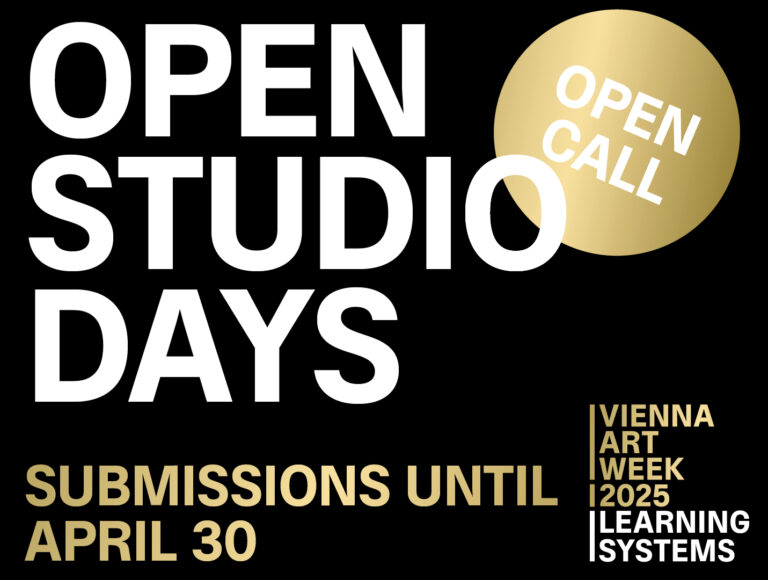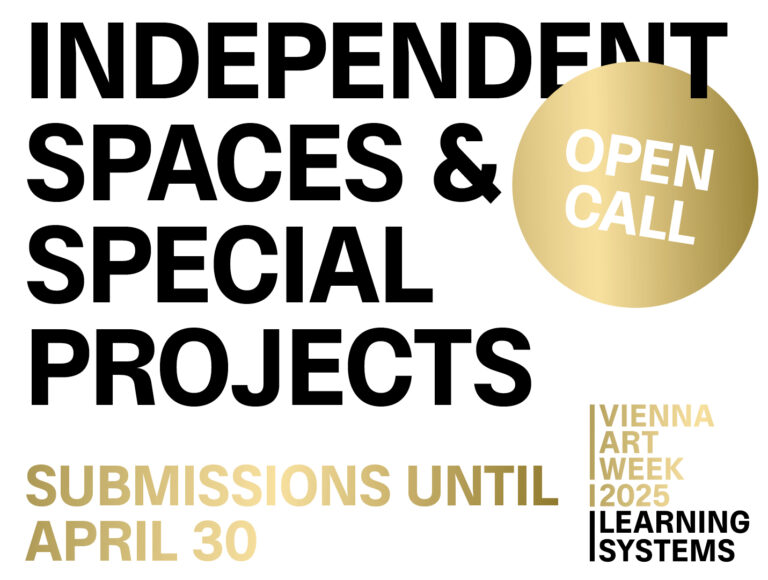LEARNING SYSTEMS
The 21st VIENNA ART WEEK is all about learning—not merely acquiring knowledge, but engaging in a dynamic process of recognition, unlearning, and rethinking. This year’s theme invites us to question the knowledge systems that shape our world, from tradition to technology, and to explore new perspectives together.

By Işın Önol and Robert Punkenhofer
Every year in November, VIENNA ART WEEK transforms the city into a vibrant hub of artistic exchange, bringing together museums, artists, theorists, galleries, and audiences to collectively engage with a shared theme. In 2025, we turn our attention to Learning Systems—an exploration of how knowledge is generated, transmitted, and adapted across history, nature, technology, and society.
At a time when intelligent machines learn from human behavior, when communities build alternative networks of knowledge, and when historical narratives are continuously rewritten, this year’s festival invites artists, institutions, and audiences to reflect on the systems that shape our understanding of the world. From ecological cycles to artificial intelligence, from oral traditions to digital archives, Learning Systems examines both the ways systems learn and the ways we, in turn, learn from systems, whether visible or invisible, dominant or suppressed, human or non-human.
This theme extends beyond the classroom or the laboratory; it is embedded in the structures that govern us, the materials we inherit, the rituals we enact, and the tools we use to process our reality. Learning is never neutral—it is shaped by power, access, and ideology, continuously shifting as systems evolve or break down. This year’s festival seeks to uncover these dynamics, celebrating knowledge in its many forms while also questioning who has access to it, who controls it, and how it is preserved or erased over time.
Learning as an embedded process
As Karen Barad suggests, learning is an active, participatory process, deeply embedded within the systems we inhabit. Knowledge is not gained by observing the world from a detached perspective but rather by recognizing that we are inherently part of it, shaping and being shaped by its ongoing processes. This means our understanding is not fixed—it is relational, adaptive, and inseparable from the social, ecological, and technological systems we are entangled with.
Bruno Latour challenges rigid, universal frameworks by questioning the dominance of singular knowledge systems, such as the traditional system of production. Instead, he emphasizes practices of engendering, dynamic, interconnected processes of generating and transmitting knowledge. From this perspective, learning is not about extracting fixed truths but about participating in evolving systems of exchange, negotiation, and adaptation.
Throughout history, societies have relied on diverse systems of knowledge transmission, from oral storytelling and apprenticeship to scientific codification and digital learning. Michel Foucault’s concept of episteme reminds us that knowledge is not simply accumulated but shaped by the structures of power and discourse determining what is seen as legitimate at any given time. Meanwhile, Donna Haraway challenges traditional systems of learning by advocating for situated knowledge, acknowledging that learning is shaped by perspective, access, and lived experience.
In the natural world, learning is an adaptive process that ensures survival. Forests communicate through underground fungal networks, sharing nutrients and warnings, while animals develop complex strategies for cooperation and problem solving. How can we learn from nature’s systems of resilience and interdependence? Similarly, in human society, communal knowledge—built through generations of storytelling, craft, and ritual—has long provided alternative learning models outside institutionalized education.
Yet, not all systems of learning are liberatory. History has witnessed systems designed to obscure knowledge, restrict access, and enforce compliance, from colonial erasures of Indigenous wisdom to the rigid hierarchies of academia and the art world. Learning is therefore not just an act of gaining knowledge, but also an ongoing process of unlearning, questioning, and resisting dominant systems.
Art as a system, the art world as a learning structure
Art can be understood as a learning system—a process of inquiry, experimentation, and transformation. Some artists create self-contained systems, using algorithmic structures, rule-based methodologies, or durational performances to investigate the mechanics of learning. Others turn their attention to the art world as a system, exposing its structures of power, validation, and exclusion.
Artists such as Hito Steyerl, Hans Haacke, and Trevor Paglen have critically engaged with the infrastructures of knowledge production, examining how power, visibility, and control operate within cultural and technological systems. Their practices resonate with the themes explored in Learning Systems, reflecting on the ways knowledge is shaped, filtered, and mediated.
The art world itself functions as a system of validation, funding, and institutional power, dictating which voices are amplified and which are marginalized. How do artists and institutions learn from—and unlearn—their inherited frameworks? Learning Systems invites museums, galleries, and independent spaces to critically engage with these structures, reflecting on their own role in shaping artistic knowledge and discourse.
Politics of algorithmic learning
As the world increasingly relies on machine learning and AI-driven systems, the festival also turns its attention to the politics of algorithmic learning. While AI has transformed fields from medicine to art, it is not a neutral tool—it learns from biased datasets, perpetuating historical inequalities and reinforcing existing power structures.
Beyond their technical capabilities, these computational systems reflect the priorities of those who design and control them—raising urgent questions about agency, ethics, and accountability. Artists such as Cécile B. Evans explore the emotional and political dimensions of automation, questioning how machines interpret human behavior. Forensic Architecture repurposes machine learning as an investigative tool, demonstrating how digital technologies can be used to expose systemic injustice. Simon Denny critically examines the influence of corporate and technological infrastructures, revealing how knowledge economies are reshaped by algorithmic forces. These inquiries reveal machine intelligence not as an autonomous force, but as part of larger socio-political systems that shape what is seen, known, and remembered.
By placing AI within the larger landscape of learning systems, the festival resists technological determinism—emphasizing that intelligence is not limited to machines. Learning also happens in nature, in communities, and through embodied experience—raising the question: what can we learn from these alternative models?
Rethinking how we learn: alternative and communal models
While institutions play a critical role in preserving knowledge, radical models of learning often thrive outside formal structures. Grassroots movements, activist networks, and experimental schools have long developed alternative, community-driven methods—rejecting top-down education in favor of participatory, decolonial, and non-hierarchical approaches.
Artistic practices have often engaged with these alternative learning structures, challenging dominant systems of knowledge production. Tania Bruguera reimagines education through acts of collective unlearning, Cecilia Vicuña weaves Indigenous oral traditions into poetic and artistic practices, and Amor Muñoz bridges craft and technology to create new forms of exchange—work that serves as a reference point for rethinking how knowledge is formed and shared.
An invitation to explore, question, and participate
Throughout the festival, Learning Systems will unfold across Vienna’s museums, galleries, and independent spaces through exhibitions, performances, workshops, and talks. More than a thematic exploration, this edition invites active engagement—whether through participatory artworks, site-specific interventions, or experimental learning formats.
As we navigate an era of rapid transformation, we ask: What can we learn from the past? What systems need reimagining? And how can art help us envision new ways of thinking, sharing, and growing—together?
We invite artists, institutions, and audiences to be part of this collective exploration—through art, through dialogue, and through the many systems that connect us.

